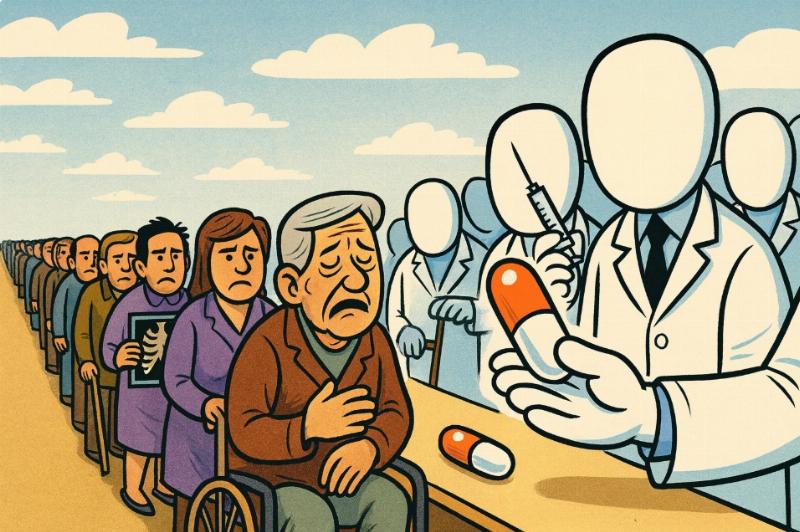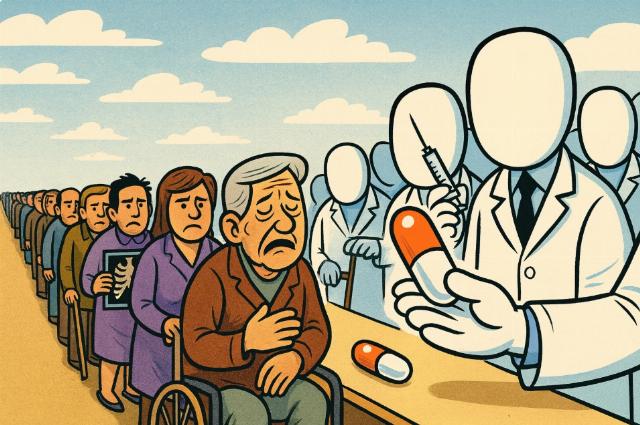


I’m not a doctor. The following are my observations of the medical system as a patient, not a professional opinion.
I’m hoping for change; that is, for Congress and President Trump to decisively end Obamacare. We must push the healthcare industry towards healing from the abominations foisted upon it by over-regulation, DEI, gaslighting, cumbersome reporting, and a system that doesn’t incentivize health. RFK Jr. is helping by slowly tackling diet and immunizations.
The pharmaceutical industry’s financial vice-grip on doctors, stifling independent diagnosis and creative, proactive treatment, does no service to the ill. Research follows funding, and if there’s no profit, there’s no research. Medical journals follow along, again bowing to the almighty Big Pharma dollar, and the result is to leave people in a downward health spiral. By pushing profits over health, the healthcare industry causes harm first, rather than actually helping many patients. The whole system needs a rewrite, lest we follow our socialist-medicine allies down the rabbit hole to healthcare Hell.

Image by AI.
We already have overt evidence of system decline. Specialist doctors have had to join large, hospital or university-based practices to circumvent the burdens placed upon them by the system. Have you tried to make an appointment with a specialist in one of these systems lately? Your GP is just a traffic director, sending you to the “right” affiliated specialist group. Need an orthopedist? First, let’s figure out which body part—the knee specialist is different than the shoulder doc. We have dedicated breast cancer surgeons who wouldn’t dream of touching another body part.
Once referred, the wait to see the right person is interminable. As is the wait to get diagnostic tests done. Typical pattern in my experience: Two-month wait for the appointment. Another two months’ wait for diagnostic tests. Another for the (often only video) appointment to go over the results. Another two months’ wait to get to the next recommended specialist for evaluation…and then, you hope, some action after that. Never mind that you must live with pain for that long. No wonder people get addicted to painkillers.
In the last few years, I’ve had several such experiences that leave me fuming. Of course, as you’re reminded every time you call a doctor or clinic, if this is an emergency, go to the ER.
I’m not condemning all of healthcare. For acute injuries and necessary major interventions, we have a good system. I’ve seen things happen very fast when the need was irrefutably urgent.
Obamacare exacerbated the shift to large group practices and, I believe, discouraged many qualified young students from pursuing a career in medicine. The over-regulation and massive paperwork requirements for both government and insurance companies made it impossible for independent doctors to survive unless they went to a concierge care model that accepts no insurance whatsoever. To accept Medicare and private insurance means foregoing profit due to negotiated rates (often, only the uninsured face the burden of paying the “real” cost)—which incentivizes doctors to chase getting paid to prescribe certain drugs and immunizations.
At a university or hospital-based practice, a doctor can focus on treatment, and the large support staff takes care of the rest. Diagnostic equipment is on-site and up to date. All good, except that it’s “managed care” and scheduling is always a nightmare. You go to the portal, you send a message (but only if you can fit your message into a pre-set category), and you await a response.
We can do better!
